This week we welcomed Victoria’s Lead Scientist to the precinct; marked World TB Day and Dieticians Week; learned how maths and geospacial information contribute to health initiatives; looked at exciting findings from research into TB, hypertension in pregnancy, COVID-19 and melanoma, and launched a new community engagement program and a recruitment drive for clinical trial participants. Here’s just some of the highlights from around the precinct…
ALFRED RESEARCH ALLIANCE
Alliance Welcomes Victoria’s Lead Scientist to Precinct
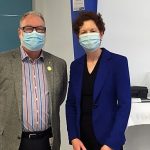 The Alfred Research Alliance today welcomed Victoria’s Lead Scientist, Dr Amanda Caples for a visit. Following an overview of the precinct’s capacity, capabilities and achievements, Dr Caples toured the Nucleus Network facilities then took part in a round-table discussion with the leadership from around the precinct. Read more…
The Alfred Research Alliance today welcomed Victoria’s Lead Scientist, Dr Amanda Caples for a visit. Following an overview of the precinct’s capacity, capabilities and achievements, Dr Caples toured the Nucleus Network facilities then took part in a round-table discussion with the leadership from around the precinct. Read more…
NUCLEUS NETWORK
‘Participate for a Mate’ clinical trial recruitment program launched
 Nucleus Network has launched a new education and awareness campaign Participate for a Mate, to generate new participant leads for its clinical studies, many of which are run at the Alfred precinct in Melbourne. Featuring 18 enthusiastic participants chatting about their motivations and experience, it will run live for four months – find out more at nucleusnetwork.com/mate
Nucleus Network has launched a new education and awareness campaign Participate for a Mate, to generate new participant leads for its clinical studies, many of which are run at the Alfred precinct in Melbourne. Featuring 18 enthusiastic participants chatting about their motivations and experience, it will run live for four months – find out more at nucleusnetwork.com/mate
BURNET INSTITUTE
TB: The clock is ticking
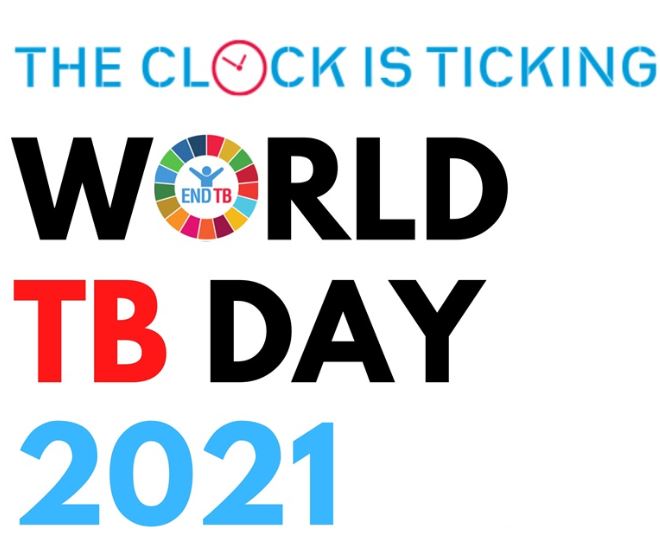 March 24 is World TB Day, bringing awareness to the health, social & economic impacts of tuberculosis, the world’s deadliest infectious disease. Although global efforts, including work done here at the Burnet Institute, have saved some 63 million lives since 2000, there is still much to be done to eliminate TB. Find out more about Burnet’s TB research, or contribute to our Campaign to STOP TB.
March 24 is World TB Day, bringing awareness to the health, social & economic impacts of tuberculosis, the world’s deadliest infectious disease. Although global efforts, including work done here at the Burnet Institute, have saved some 63 million lives since 2000, there is still much to be done to eliminate TB. Find out more about Burnet’s TB research, or contribute to our Campaign to STOP TB.
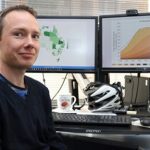 Burnet mathematical modelling – the process if using maths tomake predicitions about the real world – is not only playing a key role in Australia’s response to COVID-19, but in the fight against deadly diseases including malaria, HIV, TB and hepatitis C in more than 40 countries around the world. Dr Nick Scott heads up the Modelling and Biostatistics team – you can read more about their work here…
Burnet mathematical modelling – the process if using maths tomake predicitions about the real world – is not only playing a key role in Australia’s response to COVID-19, but in the fight against deadly diseases including malaria, HIV, TB and hepatitis C in more than 40 countries around the world. Dr Nick Scott heads up the Modelling and Biostatistics team – you can read more about their work here…
Tuburculosis: Debilitating in a COVID-19 world
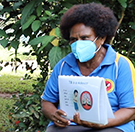 As we continue to address the COVID-19 pandemic, the parallels with tuburculosis have become apparent – particularly as the world marks World TB Day 2021 this week. “Both TB and COVID-19 are airborne infections that can be addressed together through an integrated response involving testing, community engagement, contact tracing, infection control and real time surveillance,” says Burnet’s Dr Khai Huang. Read more…
As we continue to address the COVID-19 pandemic, the parallels with tuburculosis have become apparent – particularly as the world marks World TB Day 2021 this week. “Both TB and COVID-19 are airborne infections that can be addressed together through an integrated response involving testing, community engagement, contact tracing, infection control and real time surveillance,” says Burnet’s Dr Khai Huang. Read more…
Exciting results for TB treatment trial
 Burnet Institute Infectious Diseases Specialist Dr Philipp du Cros has played a key role in an exciting and successful trial aiming to find a better treatment for rifampicin-resistant tuberculosis (TB). Dr du Cros, a member of the trial’s Steering Committee, believes the findings have the potential to change clinical practice, saying the shorter, better tolerated six-month all oral treatment ‘is superior to current care’. Read more…
Burnet Institute Infectious Diseases Specialist Dr Philipp du Cros has played a key role in an exciting and successful trial aiming to find a better treatment for rifampicin-resistant tuberculosis (TB). Dr du Cros, a member of the trial’s Steering Committee, believes the findings have the potential to change clinical practice, saying the shorter, better tolerated six-month all oral treatment ‘is superior to current care’. Read more…
BAKER HEART AND DIABETES INSTITUTE
Hypertension in pregnancy means lifelong risk
 A new study published by the Medical Republic says women who develop a hypertensive disorder during pregnancy are at greater risk of early death, particularly from cardiovascular disease. Prof Thomas Marwick from Baker Institute says this reinforces the Institute’s own work, recommending careful long-term monitoring and follow-up, even if symptoms appear to resolve after birth. Read more…
A new study published by the Medical Republic says women who develop a hypertensive disorder during pregnancy are at greater risk of early death, particularly from cardiovascular disease. Prof Thomas Marwick from Baker Institute says this reinforces the Institute’s own work, recommending careful long-term monitoring and follow-up, even if symptoms appear to resolve after birth. Read more…
Celebrating the work of our Dieticians

This week is Dietician’s Week, so we’re taking time out to recognise and celebrate the work of Baker’s Accredited Practicing Dieticians (APDs) who work in The Alfred Centre clinics providing personalised dietary advice, education and support for an array of clients, including clients living with type 2 diabetes, type 1 diabetes, gestational diabetes, high blood pressure, high cholesterol and polycystic ovarian syndrome. #MakeNoiseforAPDs
ALFRED HEALTH
Neurological effects of COVID-19 just as likely to impact young people
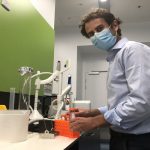
A study conducted at The Alfred has proved what researchers had already predicted – that the neurological effects of COVID-19 could remain present months after the virus has been shed. Further, Dr Robb Wesselingh said the recent study with Monash University proved that effects like stroke, brain fog and headaches are just as likely to impact young people as they are the elderly. Read more…
Deluge of DNA changes drives progression of fatal melanomas
 New research led by Prof Mark Shackleton from Alfred Health & Monash University, has used genomics to track DNA changes occurring in melanoma samples donated by patients. The team found that melanoma cells are flooded with DNA changes as this skin cancer progresses from early, treatable stages, through to fatal, end-stage disease. It is hoped the insights gained will help provide clues on how melanoma could be treated. Read more…
New research led by Prof Mark Shackleton from Alfred Health & Monash University, has used genomics to track DNA changes occurring in melanoma samples donated by patients. The team found that melanoma cells are flooded with DNA changes as this skin cancer progresses from early, treatable stages, through to fatal, end-stage disease. It is hoped the insights gained will help provide clues on how melanoma could be treated. Read more…
MONASH UNIVERSITY
Monash celebrates 60 years
 Monash this year celebrating 60 years since the University’s first cohort of 347 students was welcomed to its first campus, at Clayton, in 1961. Today, it’s one of Australia’s largest universities with two leading schools – the Central Clinical School and the School of Public Health & Preventive Medicine – operating from world-class facilities at the Alfred precinct. Read more…
Monash this year celebrating 60 years since the University’s first cohort of 347 students was welcomed to its first campus, at Clayton, in 1961. Today, it’s one of Australia’s largest universities with two leading schools – the Central Clinical School and the School of Public Health & Preventive Medicine – operating from world-class facilities at the Alfred precinct. Read more…
MONASH CENTRAL CLINICAL SCHOOL
ACBD launches community engagment program
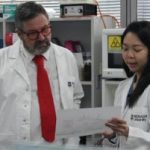 A new Community Engagement Program has been launched by the Australian Centre for Blood Diseases (ACBD), aiming to connect dedicated researchers at the ACBD with community members – or ‘consumers’ – who have experienced a blood disorder or cancer. Their valuable lived experiences will help our research teams turn new discoveries into better patient outcomes. Read more…
A new Community Engagement Program has been launched by the Australian Centre for Blood Diseases (ACBD), aiming to connect dedicated researchers at the ACBD with community members – or ‘consumers’ – who have experienced a blood disorder or cancer. Their valuable lived experiences will help our research teams turn new discoveries into better patient outcomes. Read more…
MONASH SCHOOL OF PUBLIC HEALTH & PREVENTIVE MEDICINE
PhD Profile – embracing science and technology to assess a health hazard
 The work done at SPHPM is varied and far reaching. This week, we meet Amanda Johnson, a PhD student whose interest in Geospatial Information Systems (GIS) for public health purposes drove her to conduct her PhD in the Monash Centre for Occupational & Environmental Health, which takes overall responsibility for studies like the Hazelwood Health Study. Find out more about Amanda’s work…
The work done at SPHPM is varied and far reaching. This week, we meet Amanda Johnson, a PhD student whose interest in Geospatial Information Systems (GIS) for public health purposes drove her to conduct her PhD in the Monash Centre for Occupational & Environmental Health, which takes overall responsibility for studies like the Hazelwood Health Study. Find out more about Amanda’s work…
